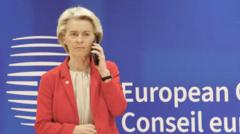The European Court has declared the European Commission's refusal to release Ursula von der Leyen's text messages to Pfizer's CEO as unjustified, marking a significant milestone for transparency in the EU.
EU Court Orders Release of von der Leyen's Pfizer Communication Amid Transparency Concerns

EU Court Orders Release of von der Leyen's Pfizer Communication Amid Transparency Concerns
The ruling emphasizes the necessity for transparency in governmental operations, specifically regarding the Covid-19 vaccine negotiations.
The European Commission's decision to withhold text messages between Ursula von der Leyen, the President of the Commission, and Pfizer CEO Albert Bourla during their vaccine negotiations has been overruled by the EU's General Court. The court determined that the Commission failed to provide a convincing argument for keeping these exchanges secret despite a request from an investigative journalist in 2021. This year marked a pivotal moment in the pandemic response when Pfizer secured contracts worth billions of euros with the EU, including 1.8 billion additional vaccine doses.
The messages have since been shrouded in mystery, giving rise to the term "Pfizergate" in Brussels. Transparency International, an anti-corruption organization, celebrated the court's ruling, labeling it a "landmark victory for transparency in the EU" and calling for a shift away from restrictive practices regarding freedom of information.
Ursula von der Leyen has been the Commission's president since 2019 and took charge during a critical phase of the pandemic, subsequently winning re-election for a second term last year. However, this court decision could compromise her public image due to the perceived obscurity surrounding the Pfizer contract. The Commission indicated that it would analyze the ruling and determine its next move but maintained that transparency is of utmost importance.
The controversy first arose in April 2021, following an article by Matina Stevis of the New York Times, which disclosed von der Leyen’s private negotiations with Bourla after BioNTech received approval for its Covid vaccine. The news prompted journalist Alexander Fanta to file a Freedom of Information request for von der Leyen’s text messages from January 2021 to May 2022. The Commission denied his request, claiming the messages did not exist within their records.
This situation highlights a gray area surrounding mobile text messages under the Commission's transparency rules, which mandates archiving of all documents, yet does not systematically categorize SMS as public records. An EU official contended that SMS were rarely treated as public documents.
Following Fanta's escalated inquiry to the European Ombudsman—who concluded that the Commission’s neglect in searching for the text messages amounted to maladministration—the case moved to court once more. The court ruled that the Commission's reliance on assumptions and vague information was unfounded, affirming that they bore the burden of proving the absence of these records. Additionally, the ruling pointed out the unclear status of whether the messages had been deleted, and if so, whether that was intentional or related to a change of devices by von der Leyen.
The messages have since been shrouded in mystery, giving rise to the term "Pfizergate" in Brussels. Transparency International, an anti-corruption organization, celebrated the court's ruling, labeling it a "landmark victory for transparency in the EU" and calling for a shift away from restrictive practices regarding freedom of information.
Ursula von der Leyen has been the Commission's president since 2019 and took charge during a critical phase of the pandemic, subsequently winning re-election for a second term last year. However, this court decision could compromise her public image due to the perceived obscurity surrounding the Pfizer contract. The Commission indicated that it would analyze the ruling and determine its next move but maintained that transparency is of utmost importance.
The controversy first arose in April 2021, following an article by Matina Stevis of the New York Times, which disclosed von der Leyen’s private negotiations with Bourla after BioNTech received approval for its Covid vaccine. The news prompted journalist Alexander Fanta to file a Freedom of Information request for von der Leyen’s text messages from January 2021 to May 2022. The Commission denied his request, claiming the messages did not exist within their records.
This situation highlights a gray area surrounding mobile text messages under the Commission's transparency rules, which mandates archiving of all documents, yet does not systematically categorize SMS as public records. An EU official contended that SMS were rarely treated as public documents.
Following Fanta's escalated inquiry to the European Ombudsman—who concluded that the Commission’s neglect in searching for the text messages amounted to maladministration—the case moved to court once more. The court ruled that the Commission's reliance on assumptions and vague information was unfounded, affirming that they bore the burden of proving the absence of these records. Additionally, the ruling pointed out the unclear status of whether the messages had been deleted, and if so, whether that was intentional or related to a change of devices by von der Leyen.





















